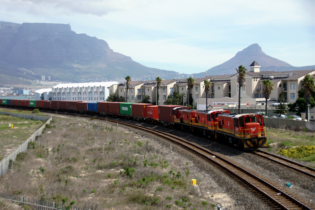Holders of South African National Roads Agency (Sanral) bonds were “very concerned” about a possible further downgrade to the agency’s debt‚ according to Sanral CFO Inge Mulder.
Their other major concern is what a long delay to the implementation of tolling on the contentious Gauteng Freeway Improvement Project would do to the financial sustainability of Sanral. “The impact on their [investors] general holding of bonds‚ be it government and other state-owned enterprises (SOEs)‚ has come under immense scrutiny from the various trustees and more than one has indicated that this will mean that further issuances by SOEs will trade wider‚ more expensively‚ than previously‚” Ms Mulder said in an e-mailed response to questions on Friday. “The court interdict against e-tolls is likely to make government borrowing more expensive‚ which will hamper the state’s efforts to accelerate economic development and job creation through its infrastructure investment programme. Last month Moody’s Investor Services downgraded Sanral’s bonds after the North Gauteng High Court stopped tolling indefinitely‚ while a legal review of Sanral’s processes was undertaken after the scheme was challenged in court by civil society group the Opposition to Urban Tolling Alliance. The court order has put the state’s ability to implement its policy of “the user-pays” as a preferred model for infrastructure development under the microscope and has raised questions in the minds of investors about its ability to execute and implement policy in other critical infrastructure programmes. In a move that betrays how worrying the development is for the government‚ it has approached the constitutional court directly to challenge the high court’s ruling‚ the matter will be argued in August. The doubt and caution that has crept into investors’ minds “is not surprising”‚ MD of Standard & Poors’ Konrad Reuss said in an interview last week. “Having policy uncertainty in general is not good for investors; policy uncertainty and policy reversals as is the case in question with Sanral is not a positive for state-owned enterprises‚” Mr Reuss said. Much like Greece had created uncertainty in the EU about the quality of government debt “Sanral’s e-toll fiasco is resulting in a bit of contagion for other SOEs‚” Mr Reuss said. Investors were used to ranking SOEs according to the amount of government support they would enjoy should they meet with some sort of financial difficulty‚ in this regard the more strategic SOEs would not be viewed in the same light as some of the smaller agencies of state‚ Mr Reuss said. “We know that there are a number of critical agencies when it comes to infrastructure roll out and the focus is still very much on power‚ Eskom‚ and transport infrastructure – there you have Transnet with its rail and pipeline projects‚” he said“But with road infrastructure Sanral does play a very critical role and the e-tolling disaster has left the road infrastructure roll out in a very difficult place‚” Mr Reuss said.
New toll roads such as the R10bn N1/N2 Winelands Toll Road has been shelved while the state comes to grips with public resistance and legal challenges to new toll road projects. A plan to extend the N3 between Pietermaritzburg and Durban has had to be abandoned as well‚ because of Sanral’s uncertain financial position‚ Ms Mulder said. Sanral held investor roadshows last week in a bid to share information and reassure holders of its debt about the state’s support and of their position after National Treasury made a R5‚75bn special allocation to the agency in February to alleviate the pressure from its balance sheet. Investors’ “biggest concern” Ms Mulder said “is whether we are able to meet our monthly obligations‚ but also they have explained what the impact of the credit downgrade from Moody’s has been on their ability to hold our bonds‚ especially the non-guaranteed NRA (National Road Agency) bonds‚” she said. “Most of the investors are willing to hold on to the SANRAL bonds for now‚ but have warned that this will change with any further adverse events. They are also not mandated to buy any further SANRAL bonds‚” Ms Mulder said. Sanral has not been able to issue bonds since September last year because of the uncertainty over e-tolling‚ while the agency has been losing as much as R300m a month in revenue. The uncertainty has also made trading the bonds difficult‚ she said. Sourcce: http://www.bizcommunity.com




